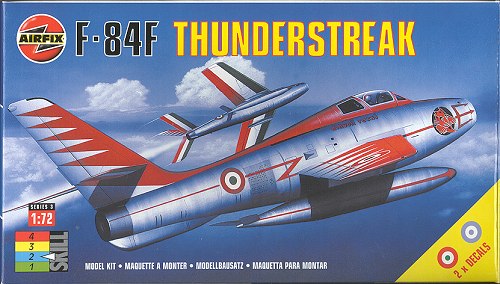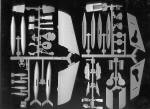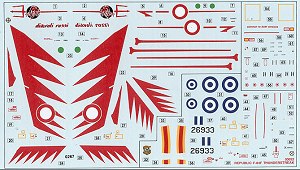
| KIT: | Airfix 1/72 F-84F Thunderstreak |
| KIT #: | 03022 |
| PRICE: | $9.98 MSRP |
| DECALS: | Two options |
| REVIEWER: | Scott Van Aken |
| NOTES: | 1974 mold date |

| HISTORY |
After the F-84 Thunderjet was designed and operational, the Sabre had proved that swept wings were the wave of the future in terms of turbojet powered aircraft. Republic Aviation then took one of its F-84s and modified it for swept wings as the XF-96. Though it wasn't the supersonic miracle that was hoped, it did greatly improve the speed of the aircraft and in the early 1950s, speed was everything. Of course, the USAF wanted it (like a kid in a candy store, the USAF wanted about everything it saw). Well, the problem was that Congress wouldn't allocate the money for a new aircraft (which is basically what the F-84F was. We see this today in the F-18E/F Super Hornet which is basically a totally new airframe). However, Congress did have oodles of cash for upgraded aircraft, something needed for the Korean War, especially as the 'plank winged' F-84E/Gs were getting mauled by the MiG-15, hence the completely different F-84F.
Thanks to some delays in getting things sorted out, the aircraft did not enter service until after the Korean War, initially as a long-range escort fighter for SAC. It soon proved itself to be an excellent fighter-bomber, replacing the older F-84E/G versions. So much so, that it was chosen by NATO for that role and served in the air forces of a multitude of nations until replaced by the F-104 or the F-4. Even then, many soldiered on for a long time with the Greeks being among the last to retire their faithful Thunderstreaks.
| THE KIT |
 It
seems as if boxes just keep getting bigger. This kit first appeared in 1974
(according to the date stamped on the inside of the fuselage) and came in a
pretty skinny box. In fact, I'd be willing to say that this edition is in a
box that is easily three times larger. Of course, this one has a bigger
decal sheet that would never fit in the old box, but still, the kit is the
same size. Molded in light grey instead of silver plastic, the mold has
held up well over the decades (you mathematicians have already figured out
that this is a 30 year old mold). There is almost no flash, the few sink
areas are very shallow (though the one
It
seems as if boxes just keep getting bigger. This kit first appeared in 1974
(according to the date stamped on the inside of the fuselage) and came in a
pretty skinny box. In fact, I'd be willing to say that this edition is in a
box that is easily three times larger. Of course, this one has a bigger
decal sheet that would never fit in the old box, but still, the kit is the
same size. Molded in light grey instead of silver plastic, the mold has
held up well over the decades (you mathematicians have already figured out
that this is a 30 year old mold). There is almost no flash, the few sink
areas are very shallow (though the one s
on the wheels will be a pain to fix) and that leaves ejector pin marks.
There are many of them on the inside of gear doors, and on the pylons,
primarily. My canopy had a bit of a chunk taken out of the frame somewhere
in the molding process. The kit also comes in an unsealed bag, something
I've not seen from Airfix before. Perhaps it is standard as it is one more
step that doesn't need done and therefore more money saved. Gotta keep the
profit level up anyway you can, you know. :(
s
on the wheels will be a pain to fix) and that leaves ejector pin marks.
There are many of them on the inside of gear doors, and on the pylons,
primarily. My canopy had a bit of a chunk taken out of the frame somewhere
in the molding process. The kit also comes in an unsealed bag, something
I've not seen from Airfix before. Perhaps it is standard as it is one more
step that doesn't need done and therefore more money saved. Gotta keep the
profit level up anyway you can, you know. :(
There is a cockpit with a generic seat and a pilot with no legs. There is also an instrument panel with some raised detail on it and a properly busy looking coaming panel. The instructions don't mention nose weight, but you'll need it. Fortunately, you can cram it into the intake splitter. The kit has options for building it with the gear up (separate 'gear up' doors are provided), the speed brakes open (they were usually closed) and with optional outer pylon bombs or drop tanks. The center gear doors are molded onto the main gear and the end result looks fine when the wheels are on.
I should bring up that if you place this kit and the Italeri F-84F side by side, you'll notice that there is a big difference in the cockpit size. The Italeri kit has it rather wide while the Airfix one seems a bit narrow. I'm not really sure exactly which one is correct (they could both be wrong), but the Italeri version looks more pleasing to my eye.
Instructions are the usual Euro-style
with no written information and just diagrams. Paint information is
strictly by Humbrol number and I'll continue to bash companies that don't
provide generic names for their paints as it is patently unfair to those
modelers who cannot get the particular 'house brand' of paint. Airfix can
consider itself bashed...again.
Markings are provided for two aircraft. One is the box art plane for the Italian demonstration team 'Diavoli Rossi' from 1950. This scheme requires the underside of the wings and stabs to be painted Green, White and Red along with the Red upper fuselage. The wing and fin decals are provided as are the tank stripes. The other scheme is from the Greek Air Force's 340 Mira at Souda Bay, Crete in 1961. Both airframes are basically bare metal. The decals are quite extensive and other than the off register yellow, are well printed. They are also quite matte and looking carefully at them, it seems the clear carrier is shifted a bit as well so I'd be wary of chipping along one edge where the carrier doesn't cover the decals. Fortunately, a lot of aftermarket decals have been done for the F-84F.
| CONCLUSIONS |
I've built this kit before and can tell you that it is pretty much what one would expect from an Airfix kit of this vintage. Fit is not bad, you get enough options to make most happy and the end result is a kit that looks good on the shelf. There is no engraved panel line F-84F in this scale that I know of so you have a choice between this and the 50% more expensive Italeri version. Your pick.
Kit courtesy of me and finding it on sale.
If you would like your product reviewed fairly and quickly by a site that has nearly 300,000 visitors a month, please contact me or see other details in the Note to Contributors.